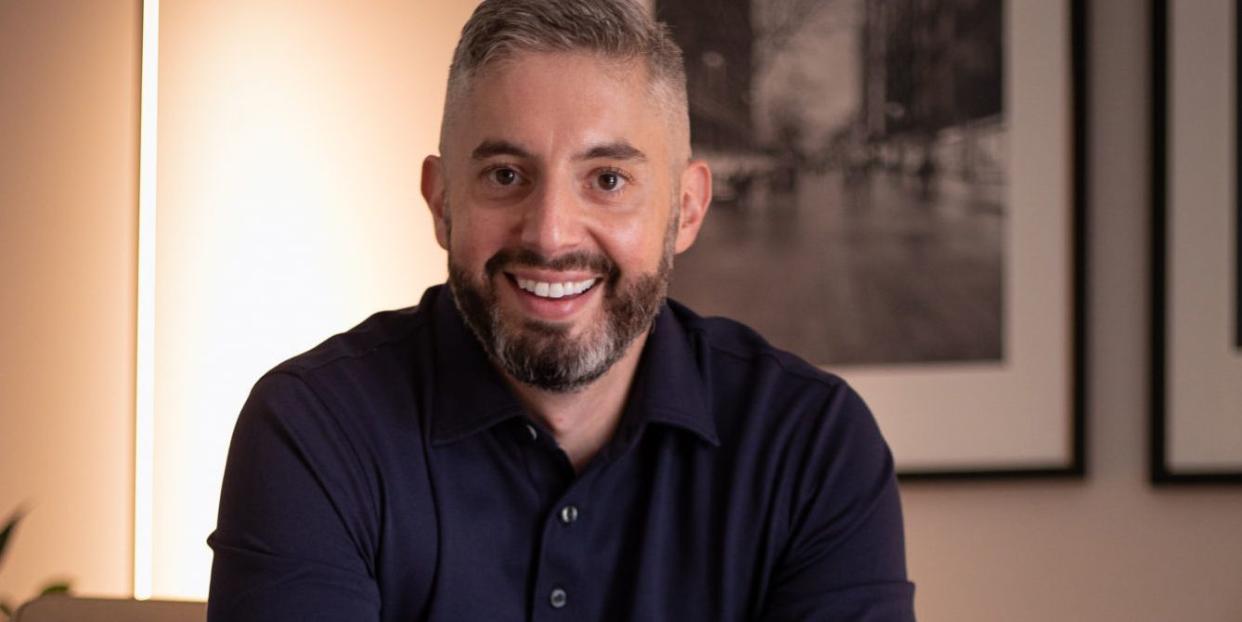How One Doc Helps Dads Tackle Fatherhood and Mental Health

Dr. Pierre Azzam may not be a dad, but he's dedicated his professional life to helping fathers thrive through his platform Braver Man.
For Mental Health Awareness Month, Dr. Azzam chatted with psychiatrist and Men's Health advisor Dr. Gregory Scott Brown on the Instagram Live show Friday Sessions about his approach to men's mental health and his work on Braver Man, a coaching platform designed to help men, especially dads, improve their overall mental health and well-being.
For Dr. Azzam, the topic of men's mental health is deeply personal. The psychiatrist and life coach was first diagnosed with major depression while in medical school. It was a time when he was learning to treat patients coping with the same illness he was silently facing, feeding his interest in the field of mental health.
"It felt very important and personal to me to be able to help other people to feel heard and like they weren't alone in their experiences when it came to mental health," Dr. Azzam said on Friday Sessions.
He especially gained an interest in men's mental health due to the nuances and stigma men face when dealing with mental illness. It's a stigma he has to confront before seeking treatment for his own depression.
"[Men] like to be competent and strong and self-sufficient," Dr. Azzam told Dr. Brown during the talk. "Often the experiences of depression itself diminishes our capacity to feel those things—to feel competent, to feel self-sufficient, to feel strong. And therefore, it becomes really difficult to reach out in search of help in those moments. And I experienced the very same thing."
Through his work in men's mental health, Dr. Azzam identified an underserved population of men needing support: fathers, especially those in early fatherhood. He created Braver Man to support men in their mental health journey, especially focusing on young fathers.
Given his focus on parenting, it may be surprising to learn Dr. Azzam isn't a dad himself. In fact, not experiencing fatherhood firsthand almost kept him from specializing in assisting dads.
"I had this big inner critic that told me, 'Well, you're not a dad. What guy is going to listen to you? How are you going to help other men who are facing something that you're not?'" he said to Dr. Brown. "But in many ways, my not being a father has been an asset."
Through his two decades of work, Dr. Azzam said he's found that the onset of post-partum depression is more 'insidious in dads," often occurring for fathers when a child is between three to six months old. Yet it's often ignored by mental health professionals.
"I didn't really appreciate that postpartum depression was even a thing for fathers until a decade into clinical practice," he said. "About 10 percent of men will experience major depression in the first year of fatherhood."
Even though one in 10 dads will struggle with depression in their first year of fatherhood, Dr. Azzam highlighted that the experience is relatively ignored. Depressed dads can then fall into the "dud" trope or the "babysitter" stereotype when really they are just trying to stay afloat in fatherhood.
So what's the solution to help dads thrive? Like everything around men's mental health, there needs to be more conversation and awareness to help challenge stigma.
"Dads are a huge part of parenting," Dr. Azzam said. "We need to be including dad in the conversation with family and inquire about how dad is doing."
Watch the full conversation here:
You Might Also Like


